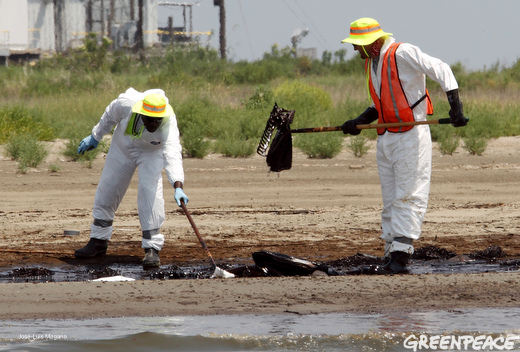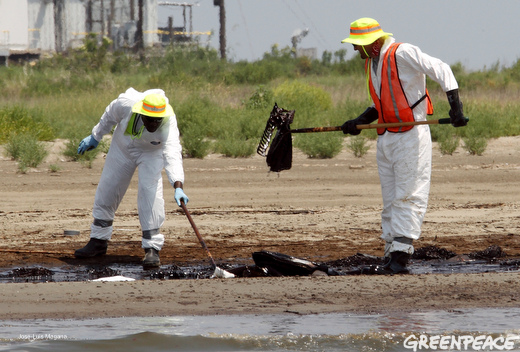 Industrial disasters create cleanup jobs. See, the system works!If there’s one thing the leaking gash in the Gulf of Mexico seems to make clear, it’s that private companies shouldn’t be left unwatched to meddle with the messy innards of our planet. They shouldn’t be allowed to open a hole they can’t close, as William Saletan puts it. The disaster makes a rather obvious case for powerful, independent, competent safety regulators that improve on the worthless oversight we got from the Minerals Management Service.
Industrial disasters create cleanup jobs. See, the system works!If there’s one thing the leaking gash in the Gulf of Mexico seems to make clear, it’s that private companies shouldn’t be left unwatched to meddle with the messy innards of our planet. They shouldn’t be allowed to open a hole they can’t close, as William Saletan puts it. The disaster makes a rather obvious case for powerful, independent, competent safety regulators that improve on the worthless oversight we got from the Minerals Management Service.
But if your ideological persuasion is that government can never be the answer, that requires more creative solutions. So, from Iain Murray of the Competitive Enterprise Institute, we get a non-ironic “non-governmental response to the Deepwater Horizon crisis” in the conservative National Review, arguing for privatizing the oceans:
No one stood ready to protect the sea — certainly not the federal government — because no one owned it. Yet there are many ways to invest the ocean with property rights. Individuals could own oceanic resources such as reefs and even shares in fish stocks. Not only would such property rights give owners a real incentive to ensure that these resources grow and develop, they give the owners an incentive to defend those rights. Thus, if a fishery or reef is threatened by a risky oil installation, the owner could take legal action to ensure that the risk is lessened. At the moment, that job is the government’s, and the government doesn’t do it. Having those most affected account for these risks would do much to internalize the external costs of oil drilling.
So Louisiana shrimpers and Florida beachgoers are supposed to take BP to court — before disasters — to make sure they’re drilling with blowout preventers and containment domes at the ready? That’s supposed to provide better protection?
With a slick spreading hundreds of miles and threatening to creep through the Florida Keys and up the Atlantic Coast, it’s ridiculous to expect everyone who might be harmed by corporate negligence to take to the courts to protect themselves. And it simply shifts responsibility to understand the risks from an agency focused on safety to federal courts, so it’s not even a “non-governmental” solution. Doesn’t work.
In a different sense, not-for-profit conservation groups take “ownership” of coral reefs, fisheries, mountain ranges, and watersheds by working to protect them. In many cases, they also work to nurture those ecosystems back to health. Awesome as that work may be, it shouldn’t replace public safeguards backed by the rule of law.
I don’t see how you privatize oceans without buyers wanting to take something from them that would leave them in worse shape. We’re still waiting for a libertarian solution to this one. Speaking of which, we’re still waiting for any solution for plugging the hole.




